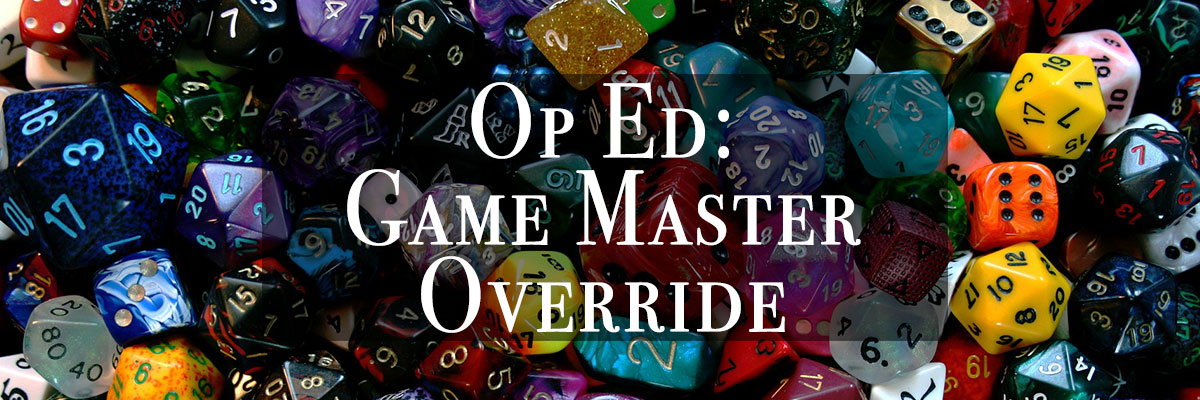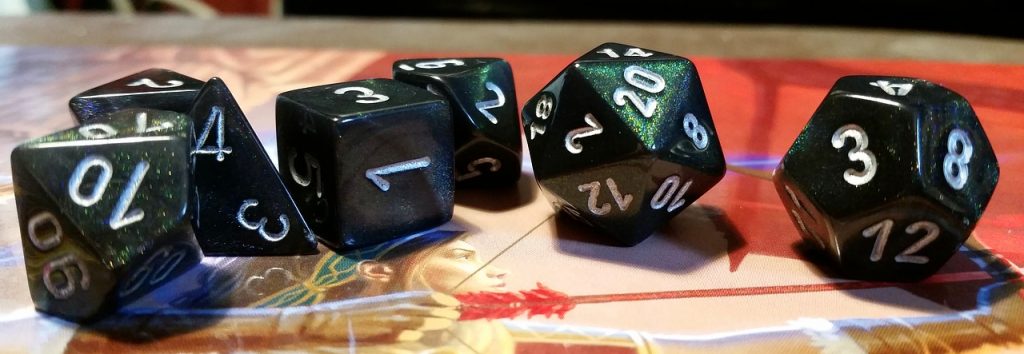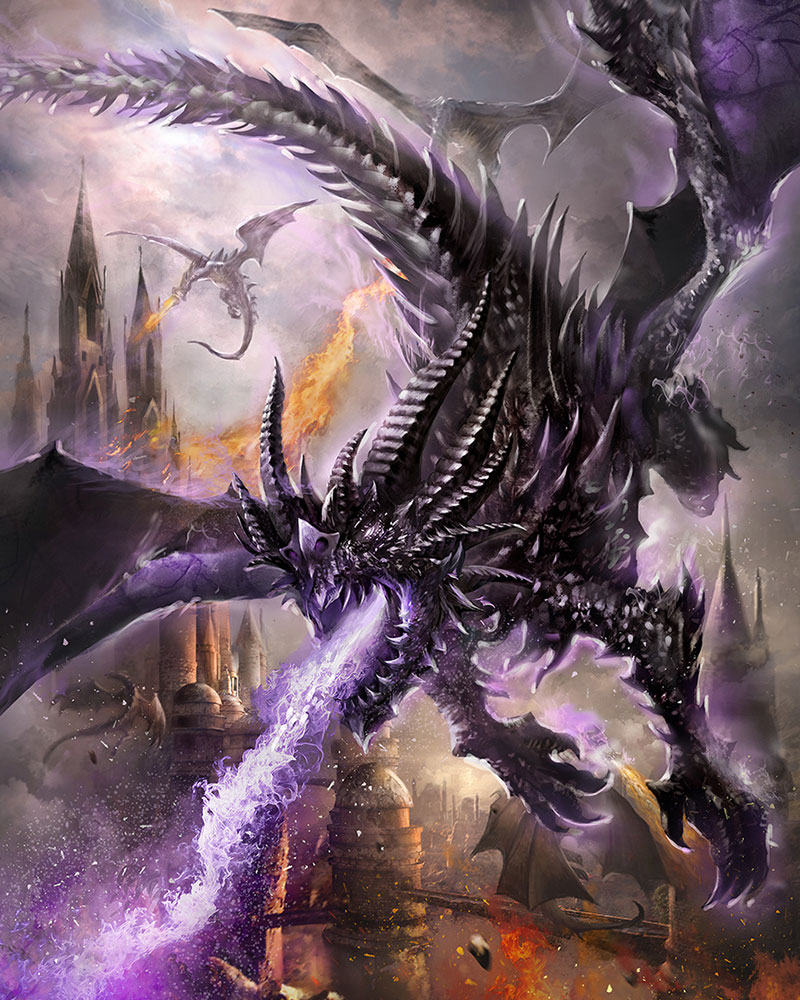Pushing the DM Override Button

Is it ever okay for a DM to ignore a rule or a roll in favor of the story? Ask a DM, and the answer will probably be yes. Ask a player… and you might be get some resistance.
The Dilemma
A few months back, my six players were deep into a grueling bit of combat that wasn’t going well for my bad guys. The Big Bad was attempting to run away when one of my players attempted to cast Hold Person on him. With this particular story, the Big Bad NEEDED to get away for the plot to continue developing. Rather than roll his Wisdom save, I simply said, “He turns and laughs at you, shrugging off your pathetic attempt to capture him.” As the DM, I knew things the players did not, and I knew the developing story was part of their enjoyment of the game. But one player insisted that I make the roll. “The spell says if he fails it, he’s paralyzed.”
Now, DMs frequently make rolls behind the DM screen; it would be a simple thing to just roll a D20, look at it and smile no matter the roll, and tell the player it failed. It’s called fudging the dice, and many DMs do it. But I don’t, and my players know it. I roll in the open, and I don’t use a DM screen.

Having it all wrong?
Did I do the wrong thing? Should I have allowed the results of the roll to determine the Big Bad’s fate? I’m quite comfortable with improvisation at the gaming table, so I could have allowed the story to take a different turn. That’s the beauty of RPGs, right? But my players had joined my table for a specific adventure that had key plot points and a storyline that was fluid in many ways but ultimately had a defined beginning, middle and end.
There are many responsibilities that the DM assumes when sitting in the DM’s chair, and one of those is adhering to the rules of the game and making certain the players follow them, too. But DMs are also tasked with providing the players with an adventure to remember… with twists and turns and the chance to save the day. Part of the fun of playing a game like D&D is never knowing what’s going to happen next, and that’s frequently felt by both players AND DM. Choosing the left door over the right door may have terrifying consequences for the players, and it’s those decisions that the DM has to be ready to see played out to the very end.
It’s all part of the job…
The title given to us is Dungeon Master. We know the secrets… we know the dangers. We are the editors, so to speak, of the story. We must make corrections, cut, re-order, and try to help the players get from point A to point Z. And that can sometimes involve twisting or even breaking the rules. DMs get away with it by rolling dice and consulting charts behind a screen. Players may suspect that some fudging of dice is going on, but they typically accept it as part of the game.
My player was visibly upset with me about my decision not to roll the Big Bad’s Wisdom save, and I understood his frustration. The rules were quite clear – cast the spell and the target must make the roll. I could have gone the easy route and said, “He has advantage on all saves versus magic.” That would have improved the odds. But what if I’d rolled a 2 and a 5? The Big Bad NEEDED to escape. I could have said, “He has resistance to spells that charm or paralyze.” My players couldn’t view the Big Bad’s stat page, so it would have been an easy out. But that ability would have had to carry over to later encounters with the party, and I didn’t want the Big Bad having that ability.
Decision time!
As the DM, I simply made the decision that the Big Bad wasn’t having any of it that day. It’s a world of magic and anything can happen. The gods can shower their blessings at will… on the good and the evil. And as DM, I shouldn’t have to explain my decisions. But do making decisions like the one I made ruin the experience for the players? How much is too much control when it comes to allowing or disallowing players to take certain actions?
What will I not do as DM? I won’t force you to take the left corridor when the party wants to go right. I won’t drop five extra orcs into the combat just because the dice were in your favor and you easily defeated the first five. And I won’t tell you that your character cannot perform an action that is legal and possible.
 Logos from Hellfire, copyright 2018 DeNA
Logos from Hellfire, copyright 2018 DeNA
We’re here to have fun!
Here’s the thing that I wish I could explain to all my players – I want you to have as much fun as possible. I want you to be on the knife’s edge when you’re in combat and down to a few hit points. I want you to worry that your character might not make the necessary roll to avoid the trap. And I want you to leave each game session with a big smile on your face. Doing all these things and more requires that you trust me as DM. And that trust means that sometimes I will bend a rule or force you to make a save that may not make sense or even override a dice roll in favor of furthering a plot complication.
Just as much as you love playing a wizard or barbarian or rogue in D&D, I love being the DM. I love the creativity and improvisation and storytelling it requires. I take the role seriously, and I try to make decisions that will ensure my players have a great evening of gaming. Good DMs try not to inhibit their players’ decisions, but we do sometimes have to step in and throw a plot twist or two at you to keep you not just awake, but also a little on edge.
But DMs –- and I’m speaking to ALL of you Dungeon Masters out there — we have a responsibility to not break rules to punish players or steer the story where we want it to go. We must always keep in mind what our players are expecting from the game and try to give them the freedom to take their characters on the adventure they are creating with us.
The unpopular resolution
Ultimately, my player accepted my decision. I don’t think he was completely happy about it, but it was easily forgotten two game sessions later when the Big Bad returned with a powerful magic item that he dropped before running away again. I believe my player finally understood that the earlier escape was necessary in order for the item to be retrieved and used against foes that the Big Bad had underestimated.
Sometimes DMs have to make hard decisions that we know our players may not like. But good DMs don’t bend rules without a valid reason. It all comes back to the story and adventure that you as DM and the players expect and want to experience with one another.

James Floyd Kelly
Writer. Adventurer. Scoundrel.
James has worked as a freelance tech writer for over 12 years, producing over 30 books for five different publishers. A long-time gamer since middle school, he has written a number of 5e adventures for Goodman Games as well as articles for Wargames Illustrated and Miniature Wargames magazines.
James is a DM for Wednesday night’s Adventurers League at Titan Games & Comics in Atlanta. When not DMing, he can also be found writing for GeekDad.com on his current favorite gaming hobbies – D&D, Frostgrave, Star Wars Legion, and Gaslands. James can also be found on YouTube where he hosts Game Terrain Engineering, a channel devoted to creating terrain for tabletop games.
Pushing the DM Override Button

Is it ever okay for a DM to ignore a rule or a roll in favor of the story? Ask a DM, and the answer will probably be yes. Ask a player… and you might be get some resistance.
The Dilemma
A few months back, my six players were deep into a grueling bit of combat that wasn’t going well for my bad guys. The Big Bad was attempting to run away when one of my players attempted to cast Hold Person on him. With this particular story, the Big Bad NEEDED to get away for the plot to continue developing. Rather than roll his Wisdom save, I simply said, “He turns and laughs at you, shrugging off your pathetic attempt to capture him.” As the DM, I knew things the players did not, and I knew the developing story was part of their enjoyment of the game. But one player insisted that I make the roll. “The spell says if he fails it, he’s paralyzed.”
Now, DMs frequently make rolls behind the DM screen; it would be a simple thing to just roll a D20, look at it and smile no matter the roll, and tell the player it failed. It’s called fudging the dice, and many DMs do it. But I don’t, and my players know it. I roll in the open, and I don’t use a DM screen.

Having it all wrong?
Did I do the wrong thing? Should I have allowed the results of the roll to determine the Big Bad’s fate? I’m quite comfortable with improvisation at the gaming table, so I could have allowed the story to take a different turn. That’s the beauty of RPGs, right? But my players had joined my table for a specific adventure that had key plot points and a storyline that was fluid in many ways but ultimately had a defined beginning, middle and end.
There are many responsibilities that the DM assumes when sitting in the DM’s chair, and one of those is adhering to the rules of the game and making certain the players follow them, too. But DMs are also tasked with providing the players with an adventure to remember… with twists and turns and the chance to save the day. Part of the fun of playing a game like D&D is never knowing what’s going to happen next, and that’s frequently felt by both players AND DM. Choosing the left door over the right door may have terrifying consequences for the players, and it’s those decisions that the DM has to be ready to see played out to the very end.
It’s all part of the job…
The title given to us is Dungeon Master. We know the secrets… we know the dangers. We are the editors, so to speak, of the story. We must make corrections, cut, re-order, and try to help the players get from point A to point Z. And that can sometimes involve twisting or even breaking the rules. DMs get away with it by rolling dice and consulting charts behind a screen. Players may suspect that some fudging of dice is going on, but they typically accept it as part of the game.
My player was visibly upset with me about my decision not to roll the Big Bad’s Wisdom save, and I understood his frustration. The rules were quite clear – cast the spell and the target must make the roll. I could have gone the easy route and said, “He has advantage on all saves versus magic.” That would have improved the odds. But what if I’d rolled a 2 and a 5? The Big Bad NEEDED to escape. I could have said, “He has resistance to spells that charm or paralyze.” My players couldn’t view the Big Bad’s stat page, so it would have been an easy out. But that ability would have had to carry over to later encounters with the party, and I didn’t want the Big Bad having that ability.
Decision time!
As the DM, I simply made the decision that the Big Bad wasn’t having any of it that day. It’s a world of magic and anything can happen. The gods can shower their blessings at will… on the good and the evil. And as DM, I shouldn’t have to explain my decisions. But do making decisions like the one I made ruin the experience for the players? How much is too much control when it comes to allowing or disallowing players to take certain actions?
What will I not do as DM? I won’t force you to take the left corridor when the party wants to go right. I won’t drop five extra orcs into the combat just because the dice were in your favor and you easily defeated the first five. And I won’t tell you that your character cannot perform an action that is legal and possible.
 Logos from Hellfire, copyright 2018 DeNA
Logos from Hellfire, copyright 2018 DeNA
We’re here to have fun!
Here’s the thing that I wish I could explain to all my players – I want you to have as much fun as possible. I want you to be on the knife’s edge when you’re in combat and down to a few hit points. I want you to worry that your character might not make the necessary roll to avoid the trap. And I want you to leave each game session with a big smile on your face. Doing all these things and more requires that you trust me as DM. And that trust means that sometimes I will bend a rule or force you to make a save that may not make sense or even override a dice roll in favor of furthering a plot complication.
Just as much as you love playing a wizard or barbarian or rogue in D&D, I love being the DM. I love the creativity and improvisation and storytelling it requires. I take the role seriously, and I try to make decisions that will ensure my players have a great evening of gaming. Good DMs try not to inhibit their players’ decisions, but we do sometimes have to step in and throw a plot twist or two at you to keep you not just awake, but also a little on edge.
But DMs –- and I’m speaking to ALL of you Dungeon Masters out there — we have a responsibility to not break rules to punish players or steer the story where we want it to go. We must always keep in mind what our players are expecting from the game and try to give them the freedom to take their characters on the adventure they are creating with us.
The unpopular resolution
Ultimately, my player accepted my decision. I don’t think he was completely happy about it, but it was easily forgotten two game sessions later when the Big Bad returned with a powerful magic item that he dropped before running away again. I believe my player finally understood that the earlier escape was necessary in order for the item to be retrieved and used against foes that the Big Bad had underestimated.
Sometimes DMs have to make hard decisions that we know our players may not like. But good DMs don’t bend rules without a valid reason. It all comes back to the story and adventure that you as DM and the players expect and want to experience with one another.

James Floyd Kelly
Writer. Adventurer. Scoundrel.
James has worked as a freelance tech writer for over 12 years, producing over 30 books for five different publishers. A long-time gamer since middle school, he has written a number of 5e adventures for Goodman Games as well as articles for Wargames Illustrated and Miniature Wargames magazines.
James is a DM for Wednesday night’s Adventurers League at Titan Games & Comics in Atlanta. When not DMing, he can also be found writing for GeekDad.com on his current favorite gaming hobbies – D&D, Frostgrave, Star Wars Legion, and Gaslands. James can also be found on YouTube where he hosts Game Terrain Engineering, a channel devoted to creating terrain for tabletop games.

0 Comments